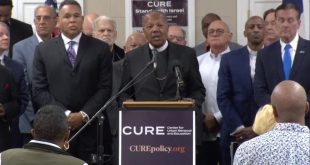 Lawyers for the plaintiffs in Vergara v. California wrote an op-ed for the Wall Street Journal to argue that it’s time for a new federal law that protects quality education for children from low-income families.
Lawyers for the plaintiffs in Vergara v. California wrote an op-ed for the Wall Street Journal to argue that it’s time for a new federal law that protects quality education for children from low-income families.
A group of government school students contended that California violates its own constitution by making it difficult for schools to dismiss ineffective teachers. A court struck down the laws in 2014, but an appeals court reversed the decision. An excerpt (emphasis added):
In its decision, the California Court of Appeal acknowledged that the laws are a “problem,” agreed that they likely lead to “grossly ineffective teachers being in the educational system,” and described the situation as “deplorable.” The court sided with the unions anyway.
…
California’s refusal to protect its young citizens has made federal protection essential. Public education meets the U.S. Supreme Court’s fundamental-right test, as articulated in Washington v. Glucksberg (1997), because it is “deeply rooted in this Nation’s history and tradition” and “implicit in the concept of ordered liberty.” Laws that impair that right should be subject to strict scrutiny under the Constitution’s due-process and equal-protection clauses.Public education has been a fundamental pillar of U.S. society since the nation’s founding, when the Continental Congress set aside public lands “to support a system of schools in a state.” As the Supreme Court put it in 1954’s historic Brown v. Board of Education ruling: “it is doubtful that any child may reasonably be expected to succeed in life if he [or she] is denied the opportunity of an education.”
The court in Brown held that “separate but equal” government schools violated the Equal Protection Clause. A different question: Do individuals have a right to an education?
The lawyers filed a new lawsuit in Connecticut with the claim that inner-city children should have a federal constitutional right to challenge laws that force them to attend bad government schools.
Magnet schools and public charter schools achieve outstanding results for students. Yet Connecticut has defied reason and imposed a moratorium on magnet schools and an effective cap on charter schools. The state also punishes high-quality public schools that accept transfer students from failing schools. Inner-city kids have to win a lottery to gain access to decent schools.
Photo credit: U.S. Department of Education (Creative Commons) – Some rights reserved
 CURE News and Clergy Blog News and Commentary for Christians
CURE News and Clergy Blog News and Commentary for Christians



